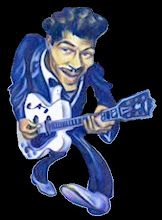
Since Rock Around The Clock had been such a success, this sequel, Don't Knock The Rock (DKTR) was quickly rushed into production and released in December of the same year (1956). DKTR however failed to garner as much success as the original movie. This caused a third movie in the series that would also have featured Bill Haley to be canceled. The failure of DKTR could also have had something to do with Haley's "rock and roll" career faltering around the same time.

In my opinion, it wasn't Haley who couldn't make this movie into a hit, instead the problem was the casting of Alan Dale (a friend of Alan Freed's) as Arnie Haines. In DKTR, Arnie Haines is supposed to be the biggest and greatest "rock and roll" star of the time. Alan Dale was a great big band singer and possessed a great set of pipes, but trying to pass him off as a great "rock and roll" singer was a fatal flaw in DKTR and I doubt audiences at the time bought the premise any more than I did. For a look at Alan Dale/Arnie Haines check out the trailer at the end of this review.

The plot of DKTR has Arnie and his band tired of the limelight and deciding to take a break and go back home to see their families and rest up. They ask Bill Haley to take over their bookings and he's glad to accommodate. Unfortunately, when Arnie and the boys arrive home they find that they're not welcome in their own hometown due to playing that "evil rock and roll" music. Adding to their woes is a nationally syndicated columnist, Arlene MacLaine (Fay Baker), who has come to town to check out Arnie and writes a column deriding their music. The publication of her column causes towns all across the U.S. to start canceling "rock and roll" shows.

Arlene's daughter Francine (Patricia Hardy) is on Arnies side and wants to prove her mother wrong. In order to combat the bad connotation that "rock and roll" has received Arnie, Francine, and Arnie's manager, Alan Freed, decide to stage a charity "rock and roll" show in the next town over. Francine will get her mother to attend and see there's nothing wrong with the music. Everything almost works out, but Arnie refuses the advances of a piece of "jailbait" (Jana Lund) and to get even she brings a bottle of liquor to the dance. All the hubbub about the liquor causes a fight to break out at the dance. The liquor and the fighting make "rock and roll" once again look bad when all of this is reported in the newspapers. Arnie comes up with a solution to show the old fogies that "rock and roll" isn't any worse than the music/dancing they grew up with and everyone comes to their senses for a happy ending.

Even though Bill Haley was listed as the star of DKTR, he's actually only a supporting player in the movie. Haley and The Comets get to perform several songs before and during the charity concert and Bill has a few speaking parts in the movie. The concert also includes The Treniers (fronted by twin brothers Claude and Cliff Trenier) who sing "Rockin' on Saturday Night" and "Out Of The Bushes" and prove what a great show band they were. Dave Appell and The Applejacks do "Applejack" and "Country Dance". Best of all we get some real "rock and roll" when Little Richard sings "Tutti Fruitti" and "Long Tall Sally". The only bad part of Little Richard's performance is he's not very animated, it appears someone told him "look into this camera" because no matter which way the shot is set up, he's always looking straight ahead.

A couple of things I neglected to mention in my review of Rock Around The Clock which also hold true for DKTR: There are some great dancers in both movies, as a matter of fact, the group dancers are much better than the featured duet dancers in both movies. I also found it odd that Haley's group included a steel guitar player. I imagine this was a holdover from Haley's country and western days. I'm not saying a steel guitar player can't rock (see Junior Brown or Robert Randolph), just that it's a strange instrument to see in a "rock and roll" band.












Overall a good review, but I must correct your false assumption that Alan Dale was chosen for the lead because he was "a friend of Alan Freed's" (which he was not). It was actually because he was a well known singer with a couple of recent R&R releases ("Rockin' the
ReplyDeletecha-cha", "Wham") which were receiving a lot of airplay.
A couple of other established veteran singers (Johnny Johnston and Johnny Desmond) were in similar films at that time for which
they were far less suited than was Alan Dale.
Ironically, outside of the USA in countries such as England, the Netherlands, Germany
Belgium and Australia, Mr. Dale was considered an outstanding R&R singer, and his most famous record was "I Cry More" which charted in many of those countries.